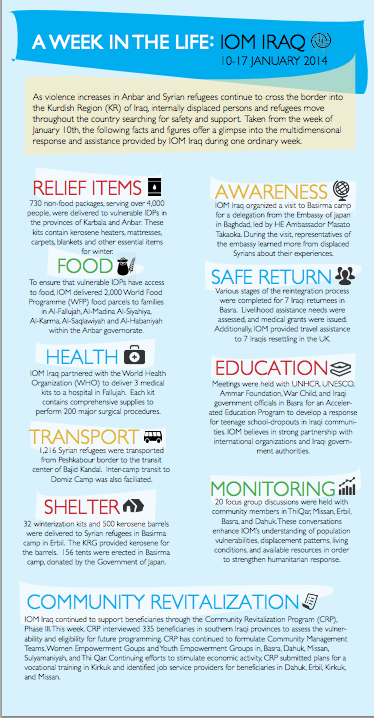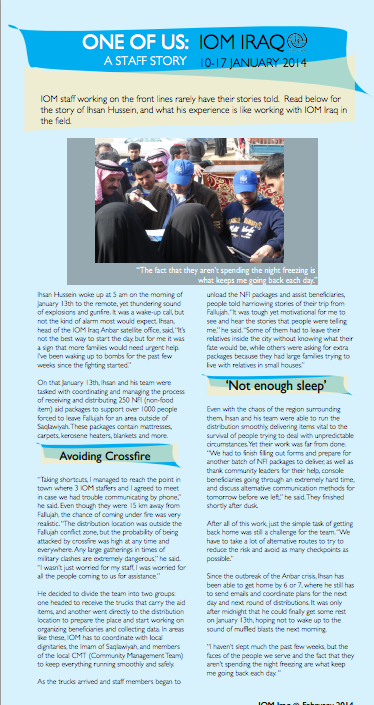Ihsan Hussein woke up at 5 am on the morning of January 13th to the remote, yet thundering sound of explosions and gunfire. It was a wake-up call, but not the kind of alarm most would expect. Ihsan, head of the IOM Iraq Anbar satellite office, said, “It’s not the best way to start the day, but for me it was a sign that more families would need urgent help. I’ve been waking up to bombs for the past few weeks since the fighting started.”
On that January 13th, Ihsan and his team were tasked with coordinating and managing the process of receiving and distributing 250 NFI (non-food item) aid packages to support over 1000 people forced to leave Fallujah for an area outside of Saqlawiyah. These packages contain mattresses, carpets, kerosene heaters, blankets and more.
“Taking shortcuts, I managed to reach the point in town where 3 IOM staffers and I agreed to meet in case we had trouble communicating by phone,” he said. Even though they were 15 km away from Fallujah, the chance of coming under fire was very realistic. “The distribution location was outside the Fallujah conflict zone, but the probability of being attacked by crossfire was high at any time and everywhere. Any large gatherings in times of military clashes are extremely dangerous,” he said. “I wasn’t just worried for my staff, I was worried for all the people coming to us for assistance.”
He decided to divide the team into two groups: one headed to receive the trucks that carry the aid items, and another went directly to the distribution location to prepare the place and start working on organizing beneficiaries and collecting data. In areas like these, IOM has to coordinate with local dignitaries, the Imam of Saqlawiyah, and members of the local CMT (Community Management Team) to keep everything running smoothly and safely.
As the trucks arrived and staff members began to unload the NFI packages and assist beneficiaries, people told harrowing stories of their trip from Fallujah. “It was tough yet motivational for me to see and hear the stories that people were telling me,” he said. “Some of them had to leave their relatives inside the city without knowing what their fate would be, while others were asking for extra packages because they had large families trying to live with relatives in small houses.”
Even with the chaos of the region surrounding them, Ihsan and his team were able to run the distribution smoothly, delivering items vital to the survival of people trying to deal with unpredictable circumstances. Yet their work was far from done. “We had to finish filling out forms and prepare for another batch of NFI packages to deliver, as well as thank community leaders for their help, console beneficiaries going through an extremely hard time, and discuss alternative communication methods for tomorrow before we left,” he said. They finished shortly after dusk.
After all of this work, just the simple task of getting back home was still a challenge for the team. “We have to take a lot of alternative routes to try to reduce the risk and avoid as many checkpoints as possible.” Since the outbreak of the Anbar crisis, Ihsan has been able to get home by 6 or 7, where he still has to send emails and coordinate plans for the next day and next round of distributions. It was only after midnight that he could finally get some rest on January 13th, hoping not to wake up to the sound of muffled blasts the next morning.
“I haven’t slept much the past few weeks, but the faces of the people we serve and the fact that they aren’t spending the night freezing are what keep me going back each day.”
*This was featured on the IOM Iraq website, and distributed as a pamphlet. http://iomiraq.net/sites/default/files/articles/en/witl_sc02-1.pdf

